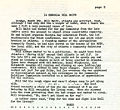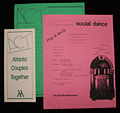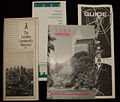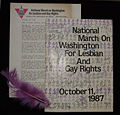Difference between revisions of "AIDS and Politics - 1980 to 1989"
| Line 7: | Line 7: | ||
Image:Atalanta note about Bill Smith.jpg|Newsletter cover, ''Atalanta'', 1980. Seen on the cover is a handwritten note from ''Atalanta'' contributor Margo to Diane, a friend of local activist Bill Smith. Courtesy of the Kenan Research Center at the Atlanta History Center. | Image:Atalanta note about Bill Smith.jpg|Newsletter cover, ''Atalanta'', 1980. Seen on the cover is a handwritten note from ''Atalanta'' contributor Margo to Diane, a friend of local activist Bill Smith. Courtesy of the Kenan Research Center at the Atlanta History Center. | ||
| − | Image:Atalanta article about Bill Smith.jpg|"In Memoriam Bill Smith," ''Atalanta'', 1980. In her memoriam about | + | Image:Atalanta article about Bill Smith.jpg|"In Memoriam Bill Smith," ''Atalanta'', 1980. In her memoriam about Bill Smith, Margo wryly wrote, "He might have been Atlanta's 'Harvey Milk' except that Atlanta is not S.F." Courtesy of the Kenan Research Center at the Atlanta History Center. |
Image:Atlanta Gay Center_Ponce_AHC.jpg|Photograph, Atlanta Gay Center, circa 1980. In 1980, the Atlanta Gay Center moved from its original location on West Peachtree Street to Ponce de Leon Avenue. Photographer unknown. Courtesy of the Kenan Research Center at the Atlanta History Center. | Image:Atlanta Gay Center_Ponce_AHC.jpg|Photograph, Atlanta Gay Center, circa 1980. In 1980, the Atlanta Gay Center moved from its original location on West Peachtree Street to Ponce de Leon Avenue. Photographer unknown. Courtesy of the Kenan Research Center at the Atlanta History Center. | ||
| − | Image:First Tuesday candidates rating_1980_AHC.jpg|Flyer, First Tuesday, 1980. Courtesy of the Kenan Research Center at the Atlanta History Center. | + | Image:First Tuesday candidates rating_1980_AHC.jpg|Flyer, First Tuesday, 1980. In it's candidates ratings for the 1980 Georgia primary election, First Tuesday assessed Republican Newt Gringrich, and many other Republican and Democratic elected officials, to be "unacceptable" for supporting the anti-gay McDonald amendment, named after local Congressman Larry McDonald, to the Legal Services Corporation Act. Courtesy of the Kenan Research Center at the Atlanta History Center. |
| − | Image:AID Atlanta newsletter 1983_AHC.jpg|Newsletter, AID Atlanta, 1983. Courtesy of the Kenan Research Center at the Atlanta History Center. | + | Image:AID Atlanta newsletter 1983_AHC.jpg|Newsletter, AID Atlanta, 1983. Pictured here, the first issue of the newsletter predicted that AIDS "has the potential of historically uniting us [LGBT individuals] in a way we have never been united." Courtesy of the Kenan Research Center at the Atlanta History Center. |
| − | Image:Pulse_cover.jpg|First issue, ''PULSE'', 1984. Courtesy of the Kenan Research Center at the Atlanta History Center. | + | Image:Pulse_cover.jpg|First issue, ''PULSE'', 1984. Premiering in 1984, ''PULSE'' was one of several short-lived publications in the early to mid 1980s. Others include ''Gaybriel'' and ''Gazette''. Courtesy of the Kenan Research Center at the Atlanta History Center. |
Image:The Journal_Aid Atlanta_1988_AARL.jpg|Courtesy of the Archives Division, Auburn Avenue Research Library on African American Culture and History. | Image:The Journal_Aid Atlanta_1988_AARL.jpg|Courtesy of the Archives Division, Auburn Avenue Research Library on African American Culture and History. | ||
Revision as of 15:16, 7 June 2010
AIDS and Politics - 1980 to 1989
The popularity of bars and parties did not wane in the 1980s, but the gay and social political landscape of Atlanta, as in other major cities, was transformed by the AIDS crisis. Though AIDS first came to national attention in 1981, in Atlanta, thanks in part to the presence of the Centers for Disease Control, gay activists began organizing around the issue as early as 1983. AID Atlanta, an all-volunteer educational and service organization, was among the first groups that formed. By the end of the decade, there existed a network of HIV/AIDS support and activist groups, including a local chapter of the AIDS Coalition to Unleash Power (ACT-UP) and programs and organizations to address women and communities of color.
Flyer, First Tuesday, 1980. In it's candidates ratings for the 1980 Georgia primary election, First Tuesday assessed Republican Newt Gringrich, and many other Republican and Democratic elected officials, to be "unacceptable" for supporting the anti-gay McDonald amendment, named after local Congressman Larry McDonald, to the Legal Services Corporation Act. Courtesy of the Kenan Research Center at the Atlanta History Center.
Much, though not all, activism during this decade centered on AIDS, and lesbians played an important role in the movement to educate people and to combat the increasingly vocal antigay forces from the Christian right and the Republican Party. As the crisis escalated, Evangelical ministers, among them Charles Stanley of the First Baptist Church of Atlanta, preached that HIV/AIDS was God's punishment for homosexuality. When Georgia native J. B. Stoner, a lifelong segregationist and white supremacist, led a mob confronting civil rights marchers in Forsyth County, Georgia, in 1987, he passed out leaflets that read "Praise God for AIDS" across the top. In the clip below, local entertainment personalities RuPaul and Wanda Peek participate in the march. <youtube>hntVo25hOgo</youtube>
During the same period, another event of national import occurred, when in 1982, Atlantan Michael Hardwick was arrested in his bedroom for engaging in oral sex with another man. Hardwick appealed, aided by the ACLU and Georgians Opposed to Archaic Laws, but in 1986 the case reached the U.S. Supreme Court, which upheld Georgia’s sodomy statute. In response to the Hardwick case, a strong belief that the U.S. government was failing to adequately address the AIDS crisis, and ongoing discrimination, LGBT Atlantans responded vocally and visibly in local marches and rallies, as well as the second national March on Washington for Lesbian and Gay Rights in 1987.
Printed materials related to the Names Project in Atlanta, Georgia, 1988. Courtesy of the Archives Division, Auburn Avenue Research Library on African American Culture and History.
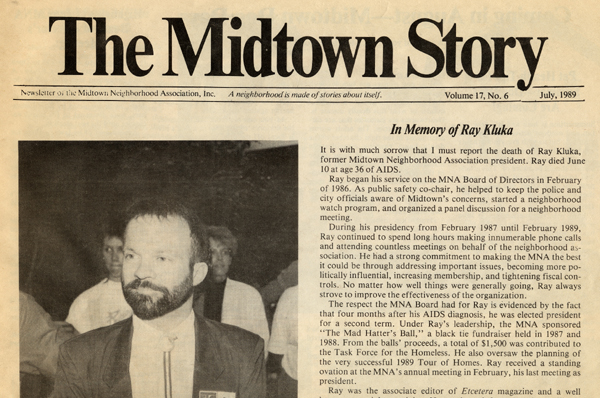
Parties and Pride - 1970 to 1979
Collective Power and Culture Wars - 1990 to 1999
Atlanta Since Stonewall, 1969-2009: A Local History <comments />

